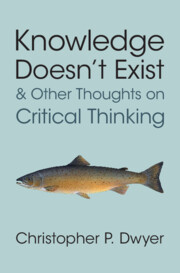Book contents
- Knowledge Doesn’t Exist and Other Thoughts on Critical Thinking
- Knowledge Doesn’t Exist and Other Thoughts on Critical Thinking
- Copyright page
- Dedication
- Contents
- Figures
- Tables
- Foreword
- An Introduction
- Chapter 1 What Exactly Is ‘Critical Thinking’?
- Chapter 2 When and Why Do We Think Critically?
- Chapter 3 Knowledge Doesn’t Exist
- Chapter 4 Understanding the Flaws of Experience and Memory
- Chapter 5 Evaluating Information Sources and Credibility
- Chapter 6 Changing Minds
- Chapter 7 Eureka Moments, Problem-Solving and Creativity
- Chapter 8 Critical Thinking Training
- Chapter 9 Implications of Social Psychology on Critical Thinking and Practical Lessons Learned in Recent Years
- Chapter 10 How Can We Really Think Critically?
- References
- Index
Chapter 5 - Evaluating Information Sources and Credibility
Published online by Cambridge University Press: 22 October 2025
- Knowledge Doesn’t Exist and Other Thoughts on Critical Thinking
- Knowledge Doesn’t Exist and Other Thoughts on Critical Thinking
- Copyright page
- Dedication
- Contents
- Figures
- Tables
- Foreword
- An Introduction
- Chapter 1 What Exactly Is ‘Critical Thinking’?
- Chapter 2 When and Why Do We Think Critically?
- Chapter 3 Knowledge Doesn’t Exist
- Chapter 4 Understanding the Flaws of Experience and Memory
- Chapter 5 Evaluating Information Sources and Credibility
- Chapter 6 Changing Minds
- Chapter 7 Eureka Moments, Problem-Solving and Creativity
- Chapter 8 Critical Thinking Training
- Chapter 9 Implications of Social Psychology on Critical Thinking and Practical Lessons Learned in Recent Years
- Chapter 10 How Can We Really Think Critically?
- References
- Index
Summary
Chapter 5 discusses the concept of credibility and what sources align with what is credible. Thorough discussion of five information sources is presented, including that pertaining to anecdotal evidence and personal experience; common beliefs and common sense; expert opinion (and opinions in general); research findings; and statistics. Discussion also involves how information from these sources can be interpreted and how all these sources can be flawed (and in what contexts).
Keywords
Information
- Type
- Chapter
- Information
- Publisher: Cambridge University PressPrint publication year: 2025
